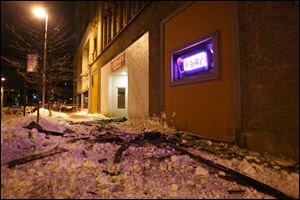
Music fades, curtain closes on once-hot Toledo night spot
3/22/2010
‘Caesar's was always the drag place in Toledo, andfor a long time really the place in Ohio,' says performer Hershae' Choco-latae', the 2009 ‘Miss GlassCiti' drag queen pageant winner.
The Blade/Amy E. Voigt
Buy This Image
Time's winged chariot has passed the aging bar inside an old downtown Toledo theater building that gained national acclaim in the 1970s for a song about a woman named "Lucille."
In more recent years, the dimly lit barroom at Jefferson Avenue and Ontario Street - closed since mid-February - was the stiletto-heeled stomping grounds of local drag queen legends with names like Denise Michaels, Hershae' Chocolatae', and Sylvia Austin.
Although Caesar's Show Bar wasn't the first drag bar in Toledo nor the only place with female impersonators, it was the best known and had the longest run, strutting through three decades of diva acts spanning Donna Summer to Lady Gaga, with every Madonna incarnation in between.
More than a niche in downtown nightlife, Caesar's attracted large and energetic "mixed" crowds of both straight and gay people during its 1980s and 1990s heyday in its original Erie Street building. Some profess that as a venue for Halloween and bachelorette parties, Caesar's may never be matched.

‘Caesar's was always the drag place in Toledo, andfor a long time really the place in Ohio,' says performer Hershae' Choco-latae', the 2009 ‘Miss GlassCiti' drag queen pageant winner.
"It was one of the hottest places to go, whether you were gay or whether you were straight," said Bill Harter, 57, of North Toledo, a customer since the early 1980s.
With new management and a change of name in January to Fascination!, the drag bar at 725 Jefferson Ave. was shut down by city officials last month for numerous code violations - blocked exits, dangerous electrical installations, untested fire systems. The "UNSAFE BUILDING" notice remained posted last week outside the building's gray metallic and rusty front door.
That front door and adjoining sidewalk - littered with bottle caps and cigarette butts - have been cordoned off by wooden barricades since last fall's partial collapse of the structure's roof cornice. A weatherbeaten plastic "CAESARS" sign hangs above where a TARTA bus slammed into the building's facade in 2005.
Bruce Rumpf, chief executive officer of nearby Job1USA, said some of his employees were nearly hit during the recent cornice collapse. Worried about future incidents, he encouraged city inspectors to check the building and its bar business.

The bar stayed in business even when the front door and sidewalk were cordoned off by barricades last fall after a partial collapse of the building's roof cornice.
"I am proud to say that I helped close Caesar's," Mr. Rumpf said. "Nothing against anybody being in business, but a lot of people were taking their lives in their hands" by going inside, he said.
Mr. Rumpf, who has expressed interest in buying the building for a real estate venture, said he was surprised to see the bar still patronized after the caution tape and wooden horses went up. "Only in Toledo could you barricade a public walkway for four months and still stay in business," he said jokingly.
Viewed in profile, this scenery of trash-strewn barricades and rusting metal can feel aesthetically out of keeping with a 112-year-old brick-and-stone edifice of Venetian-Gothic architecture that's listed in the National Register of Historic Places.
Designed by architect George Mills and modeled upon a 15th century Venetian palace, the building opened as Burt's Theatre in 1898. The venue had 1,564 seats and featured ornamented window balconies, a ladies' parlor, gentlemen's smoking room, and an extra-wide "fat man's row," according to Toledo: A History in Architecture 1890-1914by William D. Speck.
Theater manager Frank Burt knew how to pack the house. "It was a dull performance at Burt's when they didn't kill them by the score and 'stage blood' did not run in rivulets into the orchestra pit," read his 1924 obituary.
Whether fake or real, blood became well associated with his theater. Mr. Burt outlived an attempt on his life in 1904, when his wife reportedly shot him outside the theater building for what news accounts surmised as "jealousy."
Burt's closed in 1916. Its theater interior was removed and the building was converted into an auto showroom and warehouse.
The racket and swirl of the melodrama was distant history when country music songsmith Hal Bynum arrived in Toledo one summer's day in 1975 on a bus from Nashville.
As chronicled in a later Blade article, Mr. Bynum wandered across the street from the current Greyhound station at Michigan Street and Jefferson Avenue. Thirsty for beer, he stepped into the Country Palace bar that was then in the building.
As he sat at a corner table, Mr. Bynum said, he heard a conversation between a man and his estranged wife. There was an angry exchange, and the man got up and told the woman, "All I can say is, you picked a fine time to leave me."
A song idea hit him, and Mr. Bynum grabbed a napkin and started scribbling words. With later help from Roger Bowling, the idea evolved into the 1977 chart-topping Kenny Rogers country song "Lucille."
"In a bar in Toledo/ across from the depot/ on a bar stool, she took off her ring," the lyrics begin.
Much of the song was fictional; Mr. Bynum told how the name Lucille was added to make the lines rhyme.
Caesar's as a drag bar debuted in a different downtown Toledo building a few years after Lucille hit the airwaves. Owner Joe Wicks opened it inside the former Veller's livery building at 133 Erie St., now a parking lot. Caesar's had been around for a few years as a traditional bar but was closed at the time Mr. Wicks said he took over.
Mr. Wicks started his bar with his male partner, who performed on stage as Denise Michaels before his death in 1987 of Legionnaires' disease. Although Mr. Wicks occasionally dressed up and took the stage for special occasions, he said he preferred to stay himself.
One exception was in the bar's opening months, when Mr. Wicks, sensing a unique marketing opportunity, threw on an outfit and pounded the pavement.
"I dressed up as Cleopatra carrying a great big sign, and I went to all the gay bars in town and some of the straight bars and it said, "Cleopatra recommends Caesar's'•" Mr. Wicks, 69, of West Toledo, recalled recently over coffee.
During the 1980s, Caesar's expanded its shows from one evening a week to six a week, with three performances on most nights. Mr. Wicks said the bar was packed on many nights and was a real money-maker. For years, he maintained that his first two shows each day drew a predominantly straight audience.
"We had the world's largest female impersonator, Odessa Brown - 825 pounds was her average weight - and she sang live or he sang live, which ever way you want to call it," Mr. Wicks said.
Legions of local performers sashayed across Caesar's checkerboard stage through the years. Other aspirants drove down from Detroit.
A few intrepid queens tried their luck at the Mary Alice Powell look-alike contest, an homage to the retired Blade food editor.
In 1996 Caesar's moved off Erie Street to its final location at Jefferson and Ontario. Although some longtime customers say the bar lost some of its glamour in the move, Caesar's as an institution remained iconic.
"Caesar's was always the drag place in Toledo, and for a long time really the place in Ohio," said performer Hershae' Chocolatae', the 2009 "Miss Glass Citi" drag queen pageant winner.
Yet the bar started to show its age. City inspectors wrote up code violations. Renovation plans got announced but not finished. And dust began to accumulate on ceiling fans like so many layers of makeup on the performers below.
For Mr. Wicks, the beginning of the end was Nov. 29, 2005, when a TARTA bus slammed into the front of the club while swerving to avoid a motorist. The motorist was faulted in the crash. Yet Mr. Wicks said the insurance money was insufficient to fix the facade.
"After the bus came through the door of the building, a lot of the oomph went out," he said of the business.
Battling multiple cancers, Mr. Wicks said he decided last year to hand over the bar to business partners Jeff Gesler and Aaron Mitchell. The pair planned to manage the club under the Fascination! name and signed a contract to eventually acquire ownership. But that arrangement was short-lived.
"It's something I worked 30 years for. The only reason I [attempted to sell] was to keep it open because I knew I couldn't do it myself," Mr. Wicks said. "But they apparently couldn't do it either."
Shortly after the two took over, a 32-year-old Findlay man, Marland Woods, was severely beaten Dec. 13 after he was among a group ejected from the club. The attack happened at the Greyhound station parking lot - the very "depot" that once propelled the bar to unnamed stardom.
Mr. Woods died of his injuries days later. Police have since charged two men in the fatal attack.
And then the building inspectors arrived, delivering the coup de grace on Feb. 10.
Mr. Gesler said in an interview that he and Mr. Mitchell invoked a contract clause to bow out of their arrangement with Mr. Wicks, who remains the legal owner of the bar and building. He claimed that Mr. Wicks never made clear to them the extent of the building's code violations and failed to mention a lien against the bar's liquor license.
"We just kind of walked away from it and said, 'Joe, there are a lot of things that you've got to take care of,'•" said Mr. Gesler, who hopes to open a new bar downtown with Mr. Mitchell.
Mr. Wicks disputed Mr. Gesler's claims about the building's condition and insisted to The Blade that the deal took into account the liquor license lien. Moreover, he said that the partners still owe him money and that the bar's closure was all their fault.
But Mr. Wicks said he's not bitter.
After owning a string of long-closed gay bars, including Hooterville Station, Blu Jeans, and Camel Lot II, he knows that Toledo nightlife can be rough going.
"If you run a gay bar in this town for a day and a half you have a bad reputation, and I've run bars for 52 years," he said.
Contact JC Reindl at:
jreindl@theblade.com
or 419-724-6065.